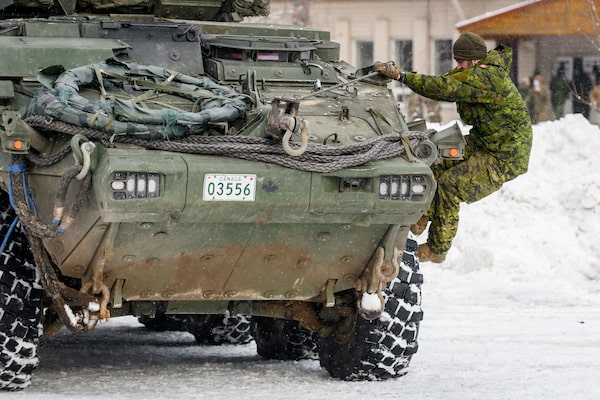
A soldier climbs onto a Canadian military vehicle during a visit to Adazi, Latvia by Canada's Minister of Defence on Feb. 3, 2022.GINTS IVUSKANS/Getty Images
Conservative Leader Pierre Poilievre has at least one thing right about Canada’s continuing failure to meet its defence-spending commitments as a member of the North Atlantic Treaty Organization: It undermines Canadian sovereignty by inviting the United States to step into the resulting vacuum.
“That puts America in charge of Canada’s future. I don’t want that,” Mr. Poilievre told reporters in Montreal last week, as he promised that a Conservative government would “work toward” increasing military spending to 2 per cent of gross domestic product, the floor that all NATO governments, Canada included, have publicly committed to.
The Conservative Leader is aiming to differentiate his party from the Trudeau Liberals who, despite recent increases in military outlays, have failed to lay out a plausible path to meeting the NATO commitment. Indeed, Prime Minister Justin Trudeau has reportedly told NATO officials privately that he does not intend to ever make good on that promise.
Defence spending has risen under the Liberals, as the government has pointed out, with Canada on track to spend 1.38 per cent of GDP in 2023, up from 0.96 per cent in 2015. But nearly two-fifths of that increase comes from a change in accounting policies that, while allowed under NATO rules, merely added existing expenditures to the official tally.
NATO Secretary-General Jens Stoltenberg praised Canada last week on progress made in boosting defence spending, but his office was silent on whether this country was one of the 18 that have met the 2-per-cent commitment. Unless we missed the Liberals announcing a $20-billion boost to the defence budget, Canada isn’t part of that club.
Getting to 2 per cent will involve substantial new dollars, and real sacrifice. But it is necessary: the world is getting more dangerous, with authoritarian powers taking ever more aggressive steps. Russia has sparked a major European ground war. China is aggressively expanding its navy and eyeing Taiwan. Iran is fomenting violence in the Middle East.
Instead of making the case to Canadians that military spending must rise to meet the authoritarian threat, the Trudeau Liberals have chosen to delay the release of a strategic defence plan and to require that the Department of Defence cut back planned expenditures as part of the government’s expenditure review. The government has promised new fighter jets and an expansion of spending on NORAD, but it has not produced a road map for getting to 2 per cent.
It shouldn’t be all that tough to do better than the current government, but so far Mr. Poilievre is failing to show how he would clear that very low bar. When asked where he would find the money to get to 2 per cent, Mr. Poilievre said he would trim foreign aid, cut the “back-office bureaucracy” and squeeze out corruption in procurement. Focusing spending on the pointy end of the spear is fine. If there is corruption, then it should be rooted out, although failures in procurement are more systemic than criminal.
Any savings would be but a fraction of the $20-billion Canada needs to spend in addition to current military outlays. And that is NATO’s floor, not a ceiling.
As for foreign aid, Mr. Poilievre’s suggestion is either ineffective or dangerously counterproductive.
If reducing foreign aid to dictatorial regimes is a sideshow without real cutbacks, then the savings will be minimal. Canada’s foreign-aid budget is just $6.9-billion a year; eliminating it entirely would only pay for about a third of the boost needed to defence spending. Significant reductions in foreign aid, however, would reduce Canada’s reach at a time when our Western allies need our help in countering the influence of authoritarian regimes, particularly China. Foreign aid, properly focused, is a necessary strategic complement to higher defence spending.
The reality is that there is no easy path. Cutbacks in the size of the civil service could free up several billions of dollars, over time. But such spending reductions won’t be enough on their own. At a minimum, higher military outlays will have to be the priority for any new revenue for Ottawa for the rest of the decade.
The Liberals have not been willing to tell Canadians about the true cost of national security, instead paying only lip service. Mr. Poilievre has the opportunity to show leadership, to make the argument that Canada must take the authoritarian threat seriously. The country has already had more than enough of foolhardy blandishments.